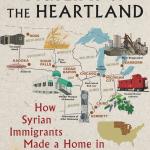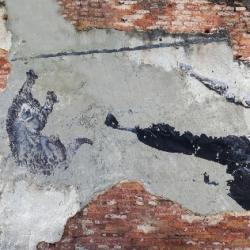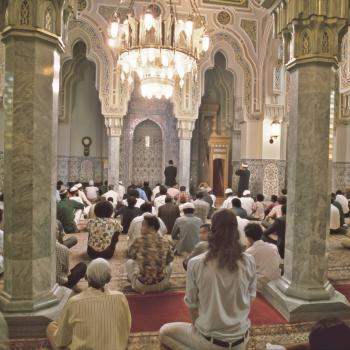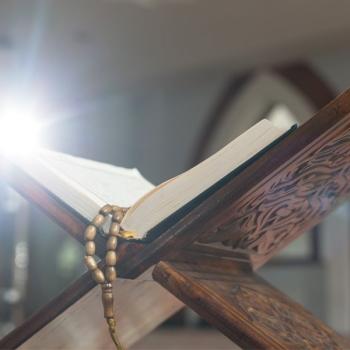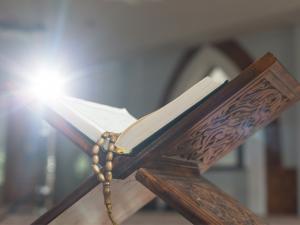
By Layla Azmi Goushey
ʿIlm: Religious and Scientific Knowledge
University scholars in the Arabian Gulf region recently convened the Online Conference on Islamic Perspectives on Exotheology, Muslim theological viewpoints regarding extraterrestrial intelligence. According to one of the co-organizers, the conference had more than 50 registered participants from at least 18 different countries across Africa, the Americas, Asia, and Europe. Participants were affiliated with a variety of Islamic, Christian, and secular institutions, including the Vatican Observatory. Experts on Islam, science, history, and popular culture presented their findings.
The Islamic Perspectives on Exotheology conference was organized by Dr. Shoaib Malik, Assistant Professor in the College of Natural and Health Sciences at Zayed University in Abu Dhabi, United Arab Emirates and Dr. Jörg Matthias Determann, Associate Professor of History at Virginia Commonwealth University School of the Arts in Doha, Qatar. While exotheology has more often been a discussion in Christianity and Judaism, this conference expanded opportunities for the academic development of Islamic frameworks for science and religion. As Dr. Malik explains, “On the academic plane, the wider field of science and religion is largely Christian-centric. Muslims are still developing the field of Islam and science, with many publications coming out in the past few decades.” Dr. Malik also notes that “Contributors have written about quantum mechanics, evolution, miracles, the relationship between reason, science, and scripture, exotheology, and medical developments and jurisprudence.” This list of diverse subjects provided by Dr. Malik is a reminder of the Muslim-Arab concept of knowledge. Dr. Determann explains, “The Arabic language does not draw a sharp distinction between religious and scientific knowledge. ʿIlm can refer to knowledge of God as well as of nature. An ʿālim (plural ʿulamāʾ) can be learned person in theology or in astronomy or both.”
Dr. Malik’s academic work demonstrates his ability to competently discuss religious and scientific ʿIlm, or knowledge. He holds a Ph.D. in Chemistry and Chemical Engineering and a Master of Science in The Philosophy of Science and Religion. Dr. Determann, a historian and author of the recent book Islam, Science Fiction and Extraterrestrial Life: The Culture of Astrobiology in the Muslim World, notes “Islamic history is full of polymaths who excelled in, and combined, different disciplines. Ibn Sina (Avicenna) and Ibn Rushd (Averroes) are among the best-known figures from the Middle Ages. In contemporary times, we still have geniuses like them. One of them is my colleague (and co-organizer of the conference) Dr. Shoaib Ahmed Malik, a philosopher, theologian, and natural scientist.”
Coinciding with the emerging discussion of Islamic frameworks for science and religion are scientific projects such as the Mars Hope Probe, launched by the United Arab Emirates in 2020 and which went into orbit around Mars in 2021. The Emirates’ Mars Mission is part of the Mars Exploration Program Advisory Group (MEPAG). As Dr. Malik explains, the United Arab Emirates’ Hope Mars Probe is a clear case of “a Muslim society doing its utmost best to become a scientific innovator.” One of MEPAG’s goals is to “Determine if Mars ever supported life, or still supports, life.” While the Mars Hope Probe mission is geared toward discovery of microbial evidence of life, astrobiologists at the National Aeronautics and Space Administration (NASA), another member of MEPAG, are considering all options regarding life in the universe. In October 2021, NASA scientists called for a framework for reporting evidence for life beyond Earth. This call corresponds with NASA’s statement about current conversations within the U.S. government that seek to clarify the origins of Unidentified Aerial Phenomena (UAP). A statement currently on the NASA website says “While NASA doesn’t actively search for UAPs, if we learn of UAPs, it would open up the door to new science questions to explore. Atmospheric scientists, aerospace experts, and other scientists could all contribute to understanding the nature of the phenomenon. Exploring the unknown in space is at the heart of who we are.” As for the possibility of extraterrestrial life, NASA Administrator Bill Nelson says, “Are we alone? Personally, I don’t think we are.”
Islam, Science, and Extraterrestrial Culture
“Muslims have generally had and want to have a positive relationship with science.” Says Dr. Malik. “Scholars of the past wanted to know of the world to see what God instilled in creation, which is what drove them to do and learn about science.” Dr. Determann, adds “Exotheologians ask how beliefs on Earth might be influenced by contact with extraterrestrials or what religious views the inhabitants of other planets may have. Most of the data we have to study such questions are the products of human minds, whether the imagination of exegetes (interpreters of holy texts) or science-fiction creators.”
One of those exegetes is Dr. Faisal Zain Abdullah, who recently earned his Doctorate in Islamic Studies at the University of California, Los Angeles. At the conference, Dr. Abdullah demonstrated through careful analysis of Quranic verses and Islamic scholarly discussions that existence of intelligent extraterrestrial life does not pose a theological conflict for Islam. Dr. Abdullah explained that pre-modern Islamic thought was able to conceive of sentient life here and elsewhere. The Quran offers verses that leave room for the discovery of the unknown. For example, Surat An-Naĥl (The Bee) states, “and (He created) horses, mules and donkeys for you to ride and use for show, and He creates other things which you know nothing about.” Dr. Abdullah also noted several verses in the Quran that refer to God as “Lord of the Worlds.” He explained that historical, Islamic scholarly texts demonstrate “the views of early Muslims on how many “worlds” or “universes of existence” are out there.” He said that while these views may sometimes differ from each other, Islamic scholarly opinions hypothesized how many worlds or domains existed and even included the characteristics of the inhabitants, such as their appearance and clothing. Dr. Abdullah also demonstrated that “humans are not necessarily superior to all other creatures from a Muslim theological perspective; and that Muslims do have theological and legal ideas that can help them maintain the relevancy of Islam should other intelligent beings be discovered.”
Dr. Mir Baiz Khan, Former Head of the Research and Knowledge Mobilization Department, Ismaili Tariqa and Religious Education Board, Canada, contributed his analysis based on Shi‘i Ismaili theological and philosophical literature. He noted that the Qur’an is the primary source for the interpretation of the Muslim faith, and theologically speaking, the Creation, “whether visible or nonvisible, terrestrial or celestial, material or spiritual it is entirely a single act under the Command of God, the uniquely One and above His creation.” Dr. Khan further explained, “creation is perpetual and limitless, and human beings are encouraged to reflect on it with knowledge and wisdom. Given the universality of Islamic principles, humanity’s continued advancement in knowledge will offer exciting possibilities.”
Art and the humanities are important contributors to how societies conceptualize scientific possibilities, discoveries, and advancements. In the case of extraterrestrial life, Dr. Determann says “So far, telescopes and space probes have not detected clear and direct evidence of life elsewhere in the universe. We can only confirm definitively that aliens reside in the human imagination.” At the conference, Dr. Determann noted the cultural presence of imagined extraterrestrial beings in Qatar’s popular culture. He presented photographs that depict extraterrestrial culture in Doha: a PlayStation advertisement that says: “This Ramadan venture to new worlds;” A school bag with a flying saucer and an alien on display at a Monoprix supermarket; an Ooredoo advertisement with the footballer Lionel Messi and a UFO on the façade of the City Center shopping mall.
Dr. Malik explains, “The fact that we can see cultural engagements with aliens without any strong or worrying concerns from the scholarly community goes a long way to show how people, at least the laity, are comfortable with the idea. Cultural representations give us sociological cues into the mind of the Muslim psyche, or at least the communities that are overtly exhibiting these ideas in various forms, in some relation to their background religious commitments.”
As for other cultural representations, Muslim science fiction writer and Islamic Exotheology conference presenter Emad El-Din Aysha adds his thoughts to Dr. Determann’s examination of cultural artifacts of the scientific imagination by saying, “There is no harm in dreaming.” Aysha is an author and editor of several science fiction stories and essays rooted in Islamic perspectives. He says, “I’m concerned with the applicability of Islamic law in a futuristic setting, Islamic economics, the feasibility of them and what they even may look like.”
While Aysha provides imaginative scenarios about Islamic beliefs in futuristic settings, the questions apply to real world experiences of Muslim astronauts. In 2007, Cosmonaut Sheikh Muszaphar Shukor of Malaysia sought advice on how to practice his Muslim faith in space. One hundred and fifty scholars were commissioned by Malaysia to study the issue and it was decided that a Muslim should turn as accurately as possible toward Mecca and at least toward the Earth, and to use a prayer schedule based on the time zone of the area where the cosmonaut lifted off from the Earth. A booklet has since been developed titled “A Guideline of Performing Ibadah at the International Space Station (ISS)” that contains a range of advice for Muslims who work in space exploration.
Aysha explains the importance of representing scientific exploration in Muslim settings. He says, “The glory days of Islam, particularly in Baghdad and in Andalus, were the glory days of science so I always want to recapture that in my writing and make the Western reader aware of this, how different our history is as Muslims than European history which had Dark Ages that sadly saw the rise of (institutionalized) religion and decline of science.”
Aysha’s work has some similarities to theory fiction as described by Dr. Carool Kersten of the Department of Theology & Religious Studies at King’s College, London, who explained that theory fiction fits under the broader concept of the scientific imagination offered by Dr. Determann. It differs from science fiction in that it places more emphasis on the imaginative use of philosophical ideas. At the conference, Dr. Kersten presented an analysis ofthe Iranian-born philosopher Reza Negarestani’s Cyclonopedia: Complicity with Anonymous Materials, a book where one character declares that the Middle East possesses sentience. Dr. Kersten made the point that in Negarestani’s philosophy, sentience refers to an embodied or natural category of intelligence, whereas sapience is a generic, functional category of intellect. He explained “This distinction between sapience/sentience is particularly germane for understanding human distinctiveness through the lens of Reza Negartestani: Only to the extent that we possess sapience are we critically aware of ourselves as sentients among other sentient beings.”
These profound conversations about extraterrestrial life are happening in several areas of the globe and in the realms of government, academia, and religious study. As Dr. Determann explains, “The sky above us is, indeed, a space shared by all humanity. Hence, people of many faiths and none have long wondered about whether there are other creatures in the heavens. Because extraterrestrials are perhaps the ultimate Other for our species, scholars interested in this topic are especially open to, and tolerant of, different cultures.”
It is worth remembering that, as Dr. Abdullah noted, Muslims do have theological and legal ideas that can help them maintain the relevancy of Islam should other intelligent beings be discovered. This openness to discovery, science, and the Other will help Muslim societies maintain a sense of stability during current and future challenges of this decade and beyond. Dr. Malik invites other scholars to join the conversation. He says, “there is still a lot of work to be done in this area, which is why I am so driven to making these conversations more accessible to the wider community. If I had to share one message with the wider world, it would be: join the conversation and contribute to the field.”
Just as Muslims have always pursued science to see what God instilled in creation, we are now in a new phase of an Islamic intellectual awakening along with other theologies and cultures around the world. Space exploration by the United Arab Emirates and other countries will provide new opportunities for scientific discovery and will deepen our ‘Ilm, or knowledge, of the limitless wonder of the universe.


